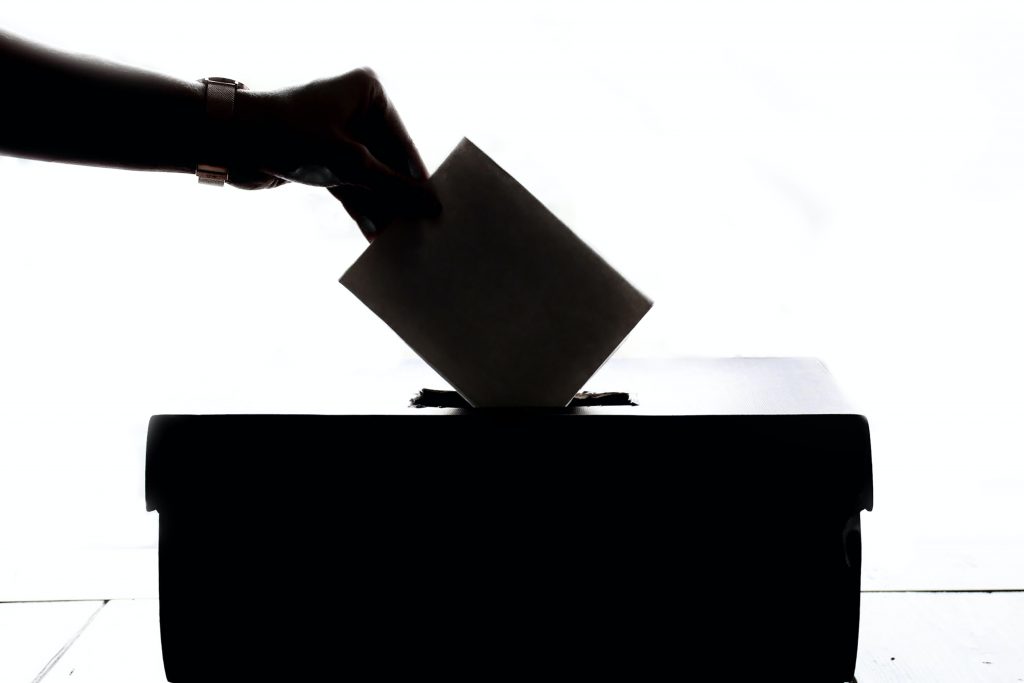Over the past few years democracy has eroded rapidly in many parts of the world, including the United States. Well-regarded global democracy indexes such as Freedom House and Varieties of Democracy (V-dem) track the sharp decline in the rating of democracy in the United States since 2016. Scholars suggest that this unfortunate global trend is explained largely by the rise to power of authoritarian populist leaders, such as Jair Bolsonaro of Brazil, Nicolas Maduro of Venezuela, and Donald Trump, who often resort to fear-mongering rhetoric and engage in the delegitimization of democratic institutions, including the electoral process.
Worries for the future of democracy amplified as Election Day approached. By casting doubt on the transparency and integrity of the election, Trump’s messages have posed a threat to democratic stability. Some of these messages on the campaign trail went so far as to encourage extremist groups to “stand back and stand by” and to urge supporters to go to the polls and “watch closely.” As noted in a Keough School research report American Democracy at Risk, experts consulted for the report anticipated scenarios in which President Trump would prematurely announce the election results as being in his favor, challenge mail-in ballots, and refuse to concede if he lost the election. The experts agreed that these reactions would weaken the democratic system in the US. Unfortunately, these scenarios materialized.
The post-election contention exposed the fault lines that had been hidden in American democracy.
Indeed, Trump, who won more votes (74.2 million) in a modern US presidential election than any candidate save Joe Biden (81.2 million) and thus manages to sway a sizeable portion of the electorate, continued his baseless charges of massive voter fraud in an attempt to subvert election results in battleground states despite facing multiple defeats in court. Undeterred by the outcome of the Electoral College votes on November 14, Trump and his backers still seek to reverse Biden’s victory, potentially turning a perfunctory confirmation of the Electoral College votes by Congress on January 6 into a divisive spectacle.
The Trump presidency is coming to an end, but not the damage to the integrity of the electoral process. The post-election contention exposed the fault lines that had been hidden in American democracy. While Trump has the right to object to the election outcome within institutional channels, the barrage of his legal strategy to revert Biden’s victory fundamentally defeats the spirit and arguably the letter of the law. Even worse is the full-on display of Trump’s authoritarian tendencies—orchestrating a far-reaching pressure campaign by badgering Republican officials in Michigan, Georgia and Pennsylvania to overturn the will of voters, seeking to appoint a special counsel to investigate allegations of voter fraud and supposedly seize voting machines, and abusing his executive fiat to grant pardons to political allies. As Senator Mitt Romney decried, of Trump’s interference with the election certification, “it is difficult to imagine a worse, more undemocratic act by a sitting American President.”
But there is good news for American democracy in all this. Biden’s electoral win has survived heavy scrutiny and been validated at every stage of the process, by Republicans and Democrats alike. Officials in all 50 states and federal agencies overseeing election security found no evidence of widespread fraud that would change the outcome of the election; the majority of world leaders have recognized Biden as president-elect; the presidential transition is underway despite a delayed ascertainment from the General Service Administration; and the Electoral College vote officially confirmed Biden’s win. The center seems to be holding, despite all the dysfunctional behavior tarnishing the process.
Still, Trump refuses to concede, presenting two major threats to American democracy: violating long-held democratic norms such as concession and power transfer in a timely and orderly manner, and politicizing democratic institutions for personal gain.
A candidate’s concession is not merely a tradition, but a fundamental act of adherence to democratic rule. As Adam Przeworski, a prominent scholar of democracy, reminds us:
Democracy is a system in which whatever conflicts emerge in a society are processed by periodic elections. Between elections, the losers wait to get their chance the next time around, or the one after that. Elections induce peace because they enable intertemporal horizons . . . elections are the Sirens of democracy. . . we are repeatedly eager to be lured by promises, to put our stakes on electoral bets. Hence, we obey and wait.
When candidates and parties seek to win by deploying their institutional prerogative to the hilt, politics is in danger of turning anarchic, putting democracy at risk. As indicated in the latest study by the Varieties of Party Identity and Organization (V-Party), the Republican Party has retreated from upholding democratic norms in recent years and is moving strongly in an illiberal direction, similar to autocratic ruling parties such as the Turkish AKP and Fidesz in Hungary. For the past two decades, the Republican Party has shown a willingness to compromise democratic principles for the pursuit of power. Trump’s anti-democratic appeals were met with silence or complacency by many Republican leaders. The recent brief supporting Texas’s lawsuit in asking the Supreme Court to overturn the results of the election was signed by 126 House Republicans, illustrating yet another case of “constitutional hardball”—exploiting the law to undermine its spirit.
Trump’s refusal to concede and the delay of the transition process resembles political crises that have transpired in recently democratized countries. In Mexico’s contested presidential election in 2006, runner-up Andrés Manuel López Obrador refused to accept his defeat, leading to mass protests and the erosion of citizen trust in the electoral process. Similarly, the post-election contention has revealed a deep divide between how Republicans and Democrats perceive Biden’s victory. Polls conducted by Vox, Monmouth University Polling Institute, and CNBC/Change Research poll found that a majority of Trump voters perceive Biden’s victory as owing to voter fraud; that is, millions of voters doubt the election’s fairness and accuracy. The Presential Transition Index (PTI), another Keough School project, which tracks the transition process, noted the pernicious consequences of this situation, not only to the health of American democracy but also to the possibility of effective governance, especially at a time when the country is still confronting a raging pandemic and other deep structural issues.
Another worrisome trend is the surge of aggressive post-election mobilizations such as the “Stop the Steal” protests. Many of them turned into street fights as seen in the latest clashes with the Proud Boys (right-wing militia) in Washington, DC. Other signs of political violence include the targeting of state officials such as Michigan Secretary of State Jocelyn Benson and election officials in Georgia with abhorrent threats and harassment by Trump supporters. Although most protests have been overwhelmingly peaceful across the country this year, the visceral fear of violent unrest lingers. Data from ACLED shows that the persistent trend of right-wing mobilization against the incoming administration could increase the risk of violence, in particular by means of mobilizations of militias and armed groups.
No doubt unifying the country, or learning to live civilly with the differences, remains one of the greatest challenges to democratic governance.
While we celebrate the record high voter turnout for this election, the massive support that both Democratic and Republican candidates received at the polls is likely to be indicative of the deep political divisions that continue to destabilize the country. The campaign and its aftermath have deepened the political polarization that has been on the rise for years. No doubt unifying the country, or learning to live civilly with the differences, remains one of the greatest challenges to democratic governance. A recent survey shows that citizens’ political views not only diverge on policy issues, but also on the level of commitment to democratic principles. Fifty-seven percent of individuals identifying as Republicans agree that “we need a leader who is willing to break some rules if that’s what it takes to set things right,” compared to 43 and 36 percent among Independents and Democrats, respectively. Only if citizens and political elites perceive democracy as the “only game in town,” can they be expected to abide by the rule of law and reject violent extremist groups that embrace racism and xenophobia.
One important first step to make American democracy more resilient is the implementation of electoral reforms that guarantee the enfranchisement of all citizens. The United States has a long history of systematic exclusion and suppression of voters of color. Modern-day voter suppression occurs through arbitrary polling place closures, vote-by-mail restrictions, erroneous voter roll purges, and overly burdensome voter ID requirements that disproportionately affect minorities, the young, and the poor. Adding barriers and virtually stripping communities of the franchise only serves to uphold a power structure that serves the majority. The efforts of grassroots organizations to safeguard the voting rights of minorities paid off in the election, as reflected, for example, in the higher voter turnout rate of African Americans in the state of Georgia compared to the previous presidential election. However, structural changes to electoral laws—tightening restrictions on the suppression tactics noted above, for example, and punishing rule-breaking—are still needed to ensure the enfranchisement of minorities in the long-run.
As the Nobel Laureate Elinor Ostrom puts it, “a core goal of public policy should be to facilitate the development of institutions that bring out the best in humans,” adding that we should ask ourselves how institutions help or hinder “the achievement of more effective, equitable, and sustainable outcomes.” In a similar vein Pope Francis argues in Fratelli Tutti that sound institutions, just regulations, and inclusive systems and structures are needed to resolve the problems plaguing the vulnerable and marginalized. Notably, he warns against using institutions to fuel our inclination to selfishness. In short, we need institutions that are grounded in a respect for innate human dignity, and policies that strengthen the efficacy of peacebuilding and violence mitigation efforts. Efforts to reduce polarization, fight disinformation, and bridge partisan divides are crucial. We must safeguard our institutions with democratic norms, fending off demagogues who would wield democratic institutions as political weapon—a tactic which, paradoxically, undermines democracy.
Maggie Shum is a postdoctoral research associate at the Keough School of Global Affairs. Her research focuses on participatory policies, policy diffusion, political party organization, and social movement.
This article is part of a series of blog posts published by the Keough School of Global Affairs. Dignity and Development provides in-depth analysis of global challenges through the lens of integral human development.
Photo by Element5digital



